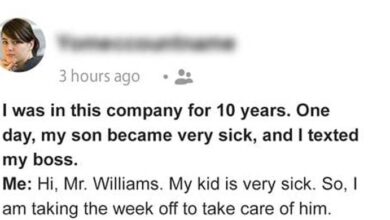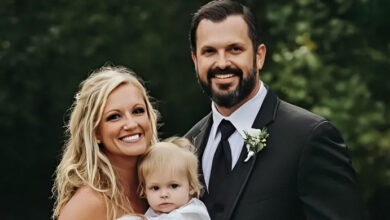I Thought I Taught My MIL a Lesson, but She Outsmarted Me After ‘Forgetting’ Her Wallet for Restaurant Dinner

In a twist that surprised me, my plan to teach my mother-in-law (MIL) a memorable lesson may have backfired spectacularly. I thought I had devised a foolproof plan to address the issue once and for all. However, my MIL, always one step ahead, turned the tables on me in a way I never saw coming.
My name is Miranda, and if you told me a few years ago that my life would be tangled in a web of family drama, love, and financial conundrums, I’d have laughed.
Yet, here I am, smack in the middle of a situation that’s as peculiar as it is frustrating. It involves my mother-in-law, Lilian, a woman whose presence in my life has been both a blessing and a challenge.
Lilian is not your typical mother-in-law. For starters, she’s John’s stepmother. But for all intents and purposes, she’s the only mom he’s known since his biological mother passed away when he was a toddler.
His dad, who was the love of Lilian’s life, died a few years ago, leaving her quite well-off financially. Lilian also made her own fortune through a successful business venture. This has allowed her a life of comfort and, dare I say, luxury.
John and I met in college, fell in love, and decided to build a life together. He’s my rock, my partner in crime, and the love of my life. But with John came Lilian, a woman of strong will and even stronger opinions.
She has four other stepchildren from John’s dad, but John is the one she visits the most. Maybe because he’s the youngest or because we’re the most welcoming.
“You two are always so good to me,” Lilian would often say, a warm smile gracing her lips. Yet, every time she visits, which is quite often since she lives out of town, she insists on staying with us instead of at a hotel and dining at the most expensive restaurants in the city.
Despite her wealth, Lilian has this peculiar habit of “forgetting her wallet,” leaving me to cover the bill.
“I just don’t understand why she does it,” I said to John one evening, frustration lacing my voice. “She knows we don’t have her kind of money.”
John, ever the peacemaker, would smile and say, “She means well, Miranda. Let’s not make a big deal out of it.”
Lilian’s visits started to feel like a carefully choreographed dance, predictable yet frustrating each time the music started. It wasn’t just about her forgetting her wallet; it felt deeper, almost like a test I was destined to fail.
Each visit, without fail, she’d suggest dining at lavish places that made my wallet quiver in fear. And each time, as the bill arrived, Lilian would pat her purse, her eyes widening with a rehearsed surprise.
“Oh dear, I must have left my wallet at your place,” she’d say, a hint of embarrassment in her voice that didn’t quite reach her eyes.
The first few times, I brushed it off, chalking it up to genuine forgetfulness. But as it became a pattern, I couldn’t help but feel taken advantage of. It wasn’t just the financial strain, although paying for extravagant meals wasn’t helping our budget.
It was the expectation, the assumption that because I made a good income, I should carry the burden of her forgetfulness.
“I don’t get it, John,” I vented one night after Lilian had left, our bank account a little lighter. “Why does she do this? If she’s testing me, what’s the point? And why me? Why not you?”
John sighed, running a hand through his hair in a gesture of defeat I’d come to recognize. “Miranda, I don’t know. Maybe she’s old-fashioned and thinks since you’re the woman, you should take care of the household, even the dining out.”
“But that’s just it, isn’t it?” I pressed on, my frustration mounting. “It’s not just ‘dining out.’ It’s like a game to her, and it’s costing us. Not just money, but it’s putting a strain on us, on me.”
The emotional toll was becoming apparent. Each visit from Lilian left me anxious, dreading the inevitable dinner dance. It wasn’t about the money anymore. It was the feeling of being manipulated and seen as nothing more than a wallet.
“I feel like she’s looking down on me, John. Like she’s challenging me and I’m failing every time,” I confessed one evening, the weight of my frustration heavy in my chest.
John wrapped his arms around me, a gesture of support in our shared dilemma. “We’ll figure this out, Miranda. We’re a team, remember?”
But as comforting as his words were, I knew something had to give. I couldn’t continue to let this cycle affect our lives or our marriage. The question was, how could I end it without causing a rift in the family?
I knew something had to change. Little did I know, the situation would take a turn I never expected.
The latest visit from Lilian came with the usual fanfare and an invitation to dine out. This time, at a restaurant so upscale it made my previous bills look like chump change.
Before we even set out, Lilian had made it abundantly clear that this was her treat, a celebration of sorts. “I’ve made reservations at Le Elegance,” she announced with a flourish, her eyes sparkling with excitement. “It’s a thank you, for always being so gracious.”
Yet, as the day approached, a nagging doubt took root in my mind. Past experiences whispered warnings, urging caution. I couldn’t shake the feeling that history was about to repeat itself. It was then, in a moment of clarity, that I decided this cycle had to end. But how?
The answer came in the form of an unexpected ally: a sitcom rerun on TV, where a character faced a similar predicament. Their solution? To preemptively solve the problem by ensuring the forgetful party’s wallet was present. It was simple, and a bit sneaky, but it sparked an idea.
On the evening of our dinner, Lilian’s pattern played out as expected. As we prepared to leave, she and John headed to the car, leaving me to “double-check” the house.
It was then I spotted it: Lilian’s wallet, almost taunting me from atop her suitcase. Heart pounding, I slipped it into my purse. This was it, my stand against the cycle.
Dinner was a blur of exquisite dishes and polite conversation. It led up to the moment I’d been dreading and anticipating in equal measure. When the bill arrived, Lilian performed her familiar routine. She patted her purse before declaring, “Oh no, I’ve forgotten my wallet again.”
I met her gaze, steadying my voice. “Actually, you didn’t.” Reaching into my purse, I placed her wallet on the table. “This wallet?”
The table fell silent, the tension palpable. Lilian’s eyes widened in shock, and then, unexpectedly, she burst into laughter. “You got me,” she conceded, a hint of respect in her voice that hadn’t been there before.
John looked from me to Lilian, confusion etched on his face. “What’s going on?”
Lilian, still chuckling, shared a look with me that seemed to say, “Well played.” “Miranda here has ended a very long game. I’ll explain later.”
As we settled the bill — separately, for the first time — I couldn’t help but feel a mix of triumph and trepidation. I had taken a stand, but what would this mean for our relationship moving forward? Had I won a battle only to start a war?
On the drive home, the car was unusually quiet. The weight of the evening hung heavily in the air, and I braced myself for what was to come. The silence was finally broken by Lilian. Her voice was softer, tinged with something I couldn’t quite place.
“You know, Miranda, I never expected you to call my bluff,” she began, her eyes meeting mine in the rearview mirror. “I guess I underestimated you.”
John, still piecing together the evening’s events, asked, “What was this all about, Lilian? Why the games?”
Lilian sighed a long, drawn-out sound that seemed to carry years of unspoken thoughts. “It wasn’t just a game, John. It was a test. A test of love, if you will.”
I frowned, struggling to understand. “A test of love? By forgetting your wallet?”
She nodded, a hint of sheepishness creeping into her expression. “Yes. You see, after your father passed, I was left wondering about my place in the family. I wanted to know if you all loved me for me, or for what I could provide,” she said.
Lilian continued, “So, I started testing my stepchildren, seeing who would be patient and loving enough to bear with me, to support me, even in something as silly as this.”
John’s brow furrowed in confusion. “And us paying for dinners was supposed to prove our love?”
“In my mind, yes,” Lilian admitted. “And you and Miranda passed with flying colors. Seven times, in fact. More than any of your siblings. You guys managed to endure the longest! I will take this into consideration when I write my will.”
I was stunned into silence. All this time, the financial strain, the emotional toll — it was all a test?
“And what about the inheritance you mentioned at the restaurant?” I asked, the memory of her words igniting a flicker of hope and fear within me.
Lilian chuckled, a sound of genuine amusement. “Oh, that was just to see your reaction. But don’t worry, you both have already secured a special place in my heart, and when the time comes, in my will too.”
The rest of the drive was filled with conversation as if a barrier had been broken down. Lilian’s unconventional test revealed her insecurities. It showed her need for familial love.
As we parted ways that night, Lilian’s parting words stayed with me. “Next time, I’ll bring my wallet. But more importantly, I’ll bring an open heart, ready to give and receive love without any tests.”
The impact of Lilian’s revelation was profound. It taught us the importance of communication, understanding, and the many forms love can take. Our family dynamic had shifted, but perhaps, for the better.
The days following our unconventional dinner with Lilian were filled with much reflection. John and I found ourselves discussing not just the events of that night but also what it meant for our future.
It was during one of these quiet evenings, with cups of tea warming our hands, that I voiced a lingering concern.
“John, do you think my actions could have jeopardized your inheritance? I mean, what if Lilian had taken offense?” The question had been eating at me, a worry I couldn’t shake off.
John took a moment, his gaze thoughtful. “Miranda, knowing Lilian, what you did might have actually impressed her. She’s always valued honesty and courage. And besides, our relationship with Lilian, or any family for that matter, shouldn’t be about money.”
I nodded, knowing he was right, yet it was comforting to hear him say it. “I guess I don’t want to be the reason for any family rifts,” I admitted.
John reached across, squeezing my hand. “You won’t be. We’re in this together, remember? And Lilian made her intentions clear. This was about love and understanding, not inheritance.”
“You know, this whole ordeal with your mom… it opened my eyes,” I began, feeling a sense of peace I hadn’t felt in a while.
John nodded, his hand finding mine. “It showed us that communication is key, isn’t it? We assumed so much about Lilian’s intentions without talking to her about how we felt.”
“Exactly,” I agreed. “And understanding. We learned to see things from her perspective, to understand her fears and insecurities. It wasn’t about the money or the dinners. It was about belonging and love.”
As we sat there, wrapped in the comfort of each other’s presence, I felt hopeful about the future. A future where Lilian, John, and I could navigate the complexities of our relationship with open hearts and minds. A future where love wasn’t tested but existed in the everyday acts of kindness and understanding.
“I think we’re on the right path,” John said, his voice full of hope. “A path that’s going to make all the difference for us and for Lilian.”
And as the sun dipped below the horizon, I couldn’t help but smile at the thought. Our little family, with all its quirks and challenges, was stronger than ever. We had learned that beneath the surface of misunderstandings and frustrations lay a deep, unshakeable bond.
A bond that, with communication and understanding, would only grow stronger. It was a comforting thought, a beacon guiding us toward a future filled with love and unity.
It was an unexpected turn of events that brought us closer, teaching us all the value of transparency and the many layers of family love.
In the end, Lilian’s promise and our collective resolution paved the way for a good future. A future where love, not financial gestures, was the cornerstone of our family dynamic. It was a lesson in understanding, patience, and the complex yet beautiful nature of family life.
What would you have done differently if you were in Miranda’s shoes? Share your thoughts on Facebook.

Woman reflecting on the events | Source: Pexels




